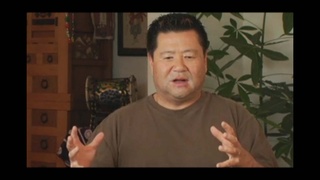Interviews
Promoting group identity through taiko contests (Japanese)
(Japanese) As I look around after 30 years of taiko playing, I see all kinds of taiko groups sprouting up and playing without any identity as Japanese style taiko. If we don’t do something to cope with this trend, these (unidentifiable) taiko styles might become mainstream. If I am asked what is an authentic Nikkei taiko, I would have a hard time explaining or defining it myself, you know. But then, I would like to see some of the players who take this taiko more seriously. I’m saying that they shouldn’t play just for fun, but I still think they should spend more time for practicing. With a little bit more practice, I’m sure the quality would improve tremendously, although they may not be aware of it. But then, I suppose you could have some kind of contest. That would provide lots of incentive for the players to practice in earnest and also think of other ideas and would really upgrade the groups’ performance.
Date: April 1, 2005
Location: California, US
Interviewer: Ann Kaneko
Contributed by: Watase Media Arts Center, Japanese American National Museum.
Explore More Videos

Traditional taiko style
(b.1943) Shin-issei grand master of taiko; founded San Francisco Taiko Dojo in 1968.

Dedicated to the frontier spirits
(b.1943) Shin-issei grand master of taiko; founded San Francisco Taiko Dojo in 1968.

American influences on Japanese taiko
Senshin Buddhist Temple minister and co-founder of Kinnara Taiko.


Taiko is a reflection of where you live
Senshin Buddhist Temple minister and co-founder of Kinnara Taiko.

Playing traditional gagaku while creating an identity
Senshin Buddhist Temple minister and co-founder of Kinnara Taiko.

Taiko as self-expression
Co-founder and creative director of San Jose Taiko

A “principally-based” taiko group in England creating a global taiko community
Co-founder and creative director of San Jose Taiko

Defining a Taiko player
(b.1951) Co-founder and managing director of San Jose Taiko.

Decision between becoming a minister or musician
(b. 1949) Musician and arts educator and adminstrator.

Japanese American taiko is not Japanese taiko
(b. 1949) Musician and arts educator and adminstrator.

Parents didn't accept me playing taiko in the beginning
(b. 1949) Musician and arts educator and adminstrator.

Tango makes him to stay in Argentina (Spanish)
(1925-2014) La Plata Hochi, Journalist


